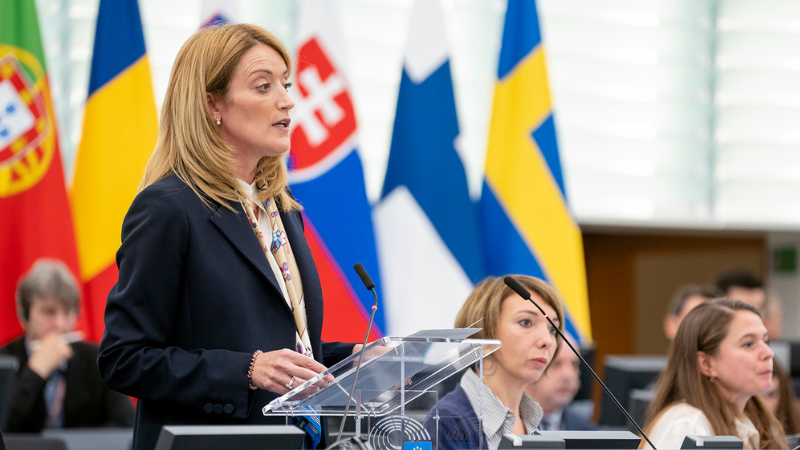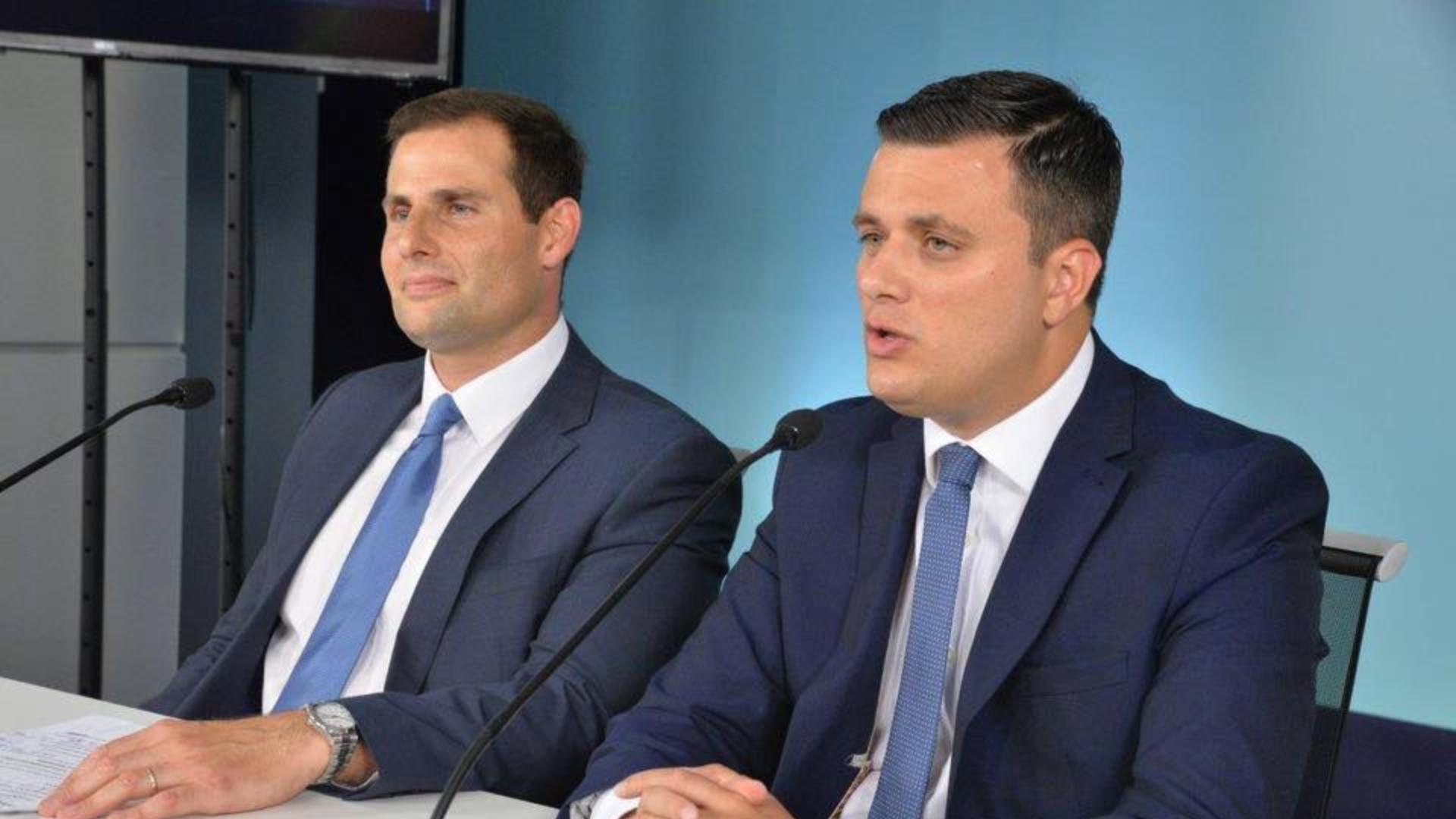Members of the European Parliament are calling on the Maltese government to immediately withdraw the 40 Freedom of Information (FOI) appeals lodged against The Shift, stating that the appeals “could send a chilling message to media actors and citizens”.
Included in the call for the government to withdraw the FOI appeals against The Shift is the concern by members of the European Parliament that obstacles to media freedom and pluralism persist, especially regarding the Maltese government’s handling of access to information, as well as potentially discriminatory funding of media outlets.
The call is one of 23 points forming part of the draft resolution that was debated by the European Parliament on Monday evening during the plenary session that focused on the Rule of Law in Malta, five years after the assassination of Daphne Caruana Galizia. The resolution will be voted on later in the week.
In her opening remarks, European Parliament President Roberta Metsola remembered Caruana Galizia and said that since her assassination, the parliament has called for justice, respect for the rule of law and media freedom and has legislated and demanded answers.
“The European Parliament will always stand on the side of truth-seekers, on the side of democracy, on the side of our values,” she added.
Most of the MEPs from all the parliamentary groups used their allocated time to honour Caruana Galizia and her work five years after she was brutally killed in a car bomb. They underscored the vital role of journalism in healthy democracies and how this role is becoming increasingly threatened, even in Europe.
MEP David Casa remembered how Caruana Galizia revealed corruption at the highest level and how she was not afraid of anyone – even the political apparatus of government was mobilised to ridicule and isolate her.

PN MEP David Casa addressing the parliament.
He added that her story is a reminder of the risks journalists face when governments drag their feet and ignore journalism in the face of evidence of corruption and crime. This is when the risks to journalists are highest, Casa noted.
“The murderers were caught, now it is the turn of politicians and officials who played their role,” Casa said adding that “Daphne deserved better, the Maltese and Gozitan people deserve better and we will continue to insist wholeheartedly to ensure full justice”.
Several other concerns about the current state of media freedom in Malta are expressed in the draft resolution. These include the lack of public consultation by the government when drafting legislative proposals for the protection of journalists and the media in Malta and that one year after the report’s publication by the Caruana Galizia public inquiry, the implementation process of its recommendations remains “deficient”.
The #RuleOfLaw in #Malta, five years after the assassination of Daphne Caruana Galizia https://t.co/Y36Ol9QHLq via @EC_AVService
— Didier Reynders (@dreynders) October 17, 2022
The resolution further calls on the Maltese government to implement all the recommendations of the public inquiry report without further delay and that the legislative work launched following the public inquiry report should comply with international standards and is fully open to public scrutiny.
These points echo the issues raised by the Council of Europe’s Commissioner for Human Rights, Dunja Mijatović, who in a letter to Prime Minister Robert Abela said, “The Maltese authorities must ensure that legislative work launched pursuant to the public inquiry report into the assassination of Daphne Caruana Galizia complies with international standards and is fully open to public scrutiny and participation.”
Mijatović too, referred to the 40 cases the government has launched against The Shift, saying it would have a “chilling effect” on freedom of expression.
The draft resolution also states that members of the European Parliament are alarmed by the lack of progress in the investigative and judicial proceedings against Pilatus Bank officials and the efforts to stall proceedings by the Maltese authorities.
It also underscores the lack of progress against the two Nexia BT partners and calls on the European Commission and Moneyval to monitor the case and expresses further concerns about the allegations of money laundering and corruption concerning the Electrogas deal and asks the Commission to use all tools at its disposal to assess whether the applicable European law was followed.
In his intervention at the start of the debate, European Commissioner for Justice Didiers Reynders noted that although several rule of law reforms in Malta have been implemented since 2020, several challenges remain, one of which is the length of judicial proceedings which Reynders describes as having deteriorated.
The deterioration of the efficiency of the Maltese justice system was also one of the resolution points, while another point voices the European Parliament’s concern about the reported lack of cooperation from Maltese authorities with the European Public Prosecutor’s Office (EPPO) in ongoing cases.
Another concern outlined in the resolution, and one which was expressed earlier this year by the European Parliament’s LIBE Committee in their report following their visit to Malta, was the impunity afforded to key figures in former prime minister Joseph Muscat’s administration.
These include the former prime minister himself, his chief of staff, Keith Schembri, and the former minister for tourism, formerly the minister for energy Konrad Mizzi.
Justice must be done, the rule of law must prevail. Impunity must end; really and truly. pic.twitter.com/vbkzAbrZWR
— Sophie in 't Veld (@SophieintVeld) October 17, 2022
During the plenary debate on Monday, Dutch MEP Sophie in’t Veld started by honouring Caruana Galizia and noted that almost everything Caruana Galizia wrote about turned out to be true, yet “hardly any of those cases have been adequately investigated, let alone brought to trial,” adding that impunity must end “really and truly”.
She added that in these turbulent times, Maltese, as well as European citizens, are entitled to stable and honest governments and that journalists are vital to helping keep governments honest and that they must be able to do their job in safety.
In’t Veld rounded up her intervention with a quick message to disgraced former prime minister Joseph Muscat who in July took issue with LIBE Committee’s report and, via his lawyers, Pawlu Lia and Charlon Gouder, penned a letter to the Committee MEPs objecting to their remarks.
“I believe you need your lawyers for more urgent matters than writing letters to MEPs telling them what they can and cannot say,” she concluded.
The draft resolution also reminds the Maltese authorities to fully implement all outstanding recommendations by the Parliamentary Assembly of the Council of Europe, the Venice Commission, and the Group of States against Corruption and Moneyval and calls on the government to request the Venice Commission’s opinion on compliance with its recommendations.
A vote on the proposed resolution will take place on Thursday.














The worst was the state terror against Daphne Caruana Galizia with the aim of dehumanising her.
The Maltese government still has a duty to make financial reparations to her children and parents.
BTW:
The fact that the shabby Joseph Muscat is receiving a financial farewell gift with additional use of buildings is simply inconceivable and cannot be argued with. He is just a parasite.